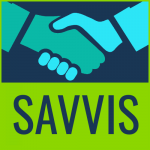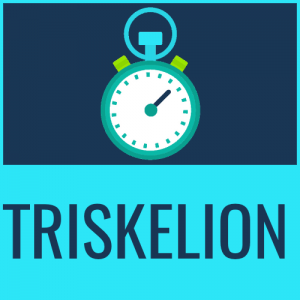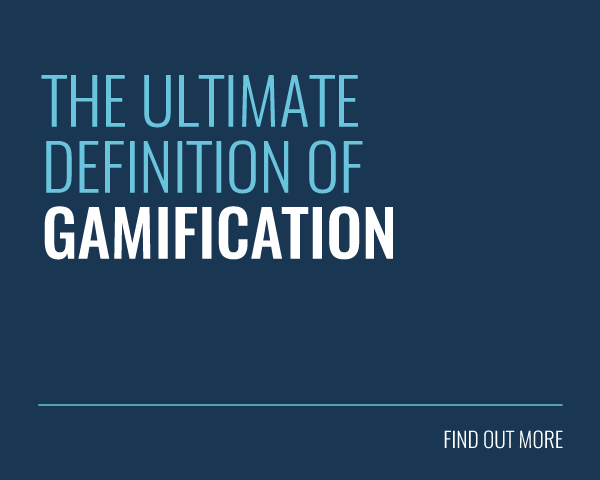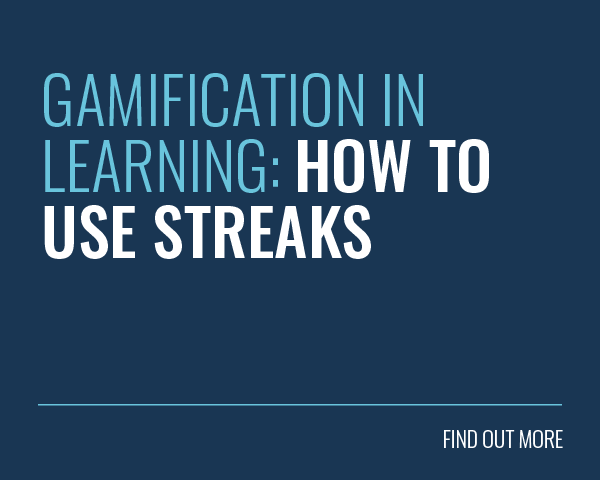Game-based learning is a hot topic in L&D and it doesn’t take long for somebody to ask the question: Does it actually work? These game-based learning initiatives might just give you the answer…
Since game-based learning is a relatively new approach to instruction, research into the efficacy of learning games isn’t very widespread. However, the mechanics behind it have been covered in depth.
Learning Games focus on interaction rather than instruction, and evidence1 supports the hypothesis that learners are more engaged with the learning material when they have more control over it.
In another study 2, it was found that computer-based simulations elicit better learner performance and knowledge retention than non-simulation instruction.
This is backed up by research 3 carried out by Traci Sitzmann, University of Colorado Denver. The meta-study found that, compared to other methods, simulation games deliver:
- 20% higher post-training self-efficacy
- 11% higher declarative knowledge
- 14% higher procedural knowledge
- 9% higher retention
1. Cavus et al. 2007; Dinov, Sanchez and Christou 2008; Gao and Lehman 2003; Zhang 2005
2. The impact of computer-based simulation within an instructional sequence on learner performance in a web-based environment (Castaneda, 2008)
3. A Meta-Analytic Examination of the Instructional Effectiveness of Computer-Based Simulation Games (Sitzmann, 2011)
Academic studies are one thing, but what about real-world examples of successful game-based learning initiatives?
 Savvis Drives ROI with Merchants
Savvis Drives ROI with Merchants
US IT service provider, Savvis, introduced Merchants to their sales teams. Merchants is a learning game designed to improve negotiation skills and customer communication. They sought an interactive solution that gave the learners a chance to practice their skills, whilst engaging them.
Within 6 weeks of launching the 8-10 hour programme, a whopping 80% of learners had completed it. Savvis’ CLO, Jim Sokolowski was understandably delighted:
”Getting 80% completion on a comprehensive sales learning intervention is no small accomplishment since training time takes away from their time selling. This high completion percentage indicates a high perceived value to the sales force since this became a priority for the team.”
 Triskelion Changes behaviour
Triskelion Changes behaviour
Triskelion is a time management game developed by Gamelearn. It was created to help individuals in fast-paced jobs to manage their workload more effectively and become more productive.
Built as an around-the-world treasure hunt, Learners playing Triskellion need to manage the workflow of Professor Robert Wise. As they keep his inbox clear and his schedule up-to-date, learners also have to keep his stress down and his energy up to improve his productivity.
As proof of its ability to engage, the course saw a 92% completion rate and the potential for cultural change was also emphasised with 97% of students applying the training in their jobs.
 Codecademy: Simulations to success
Codecademy: Simulations to success
With the explosion in information technology in the last few decades, more and more people want to learn and improve their programming skills.
Codecademy answers this need with their online programming tutorials. Although this is more of a gamified learning experience, Codecademy shares a lot of traits with learning games.
In each lesson, coding simulators let learners practise each command and line of code as they go. This interactive format has made it one of the most popular training resources, with 24 million users completing 100 million exercises as of January 2014.
Like many game-based learning initiatives, the real wins are demonstrated in the individual stories, like Ash Robinson’s:
“I set about using what I’d learned through Codecademy as the basis for learning C, C++ and Objective-C and within a few months I had my first app on the App Store.”
– Ash Robinson (Codecademy User)
 DuoLingo makes learning more efficient
DuoLingo makes learning more efficient
DuoLingo is an app designed to help people learn another language. As their skills improve, learners earn experience points and climb a gamified skill tree. The app also features timed challenges in which the learner has to answer 20 questions in 30 seconds, gaining XP and additional time for every correct answer.
Professors at the City University of New York and the University of South Carolina found that after 34 hours using DuoLingo, learners could reach a level that would take over 130 hours in a traditional college scenario.
The McDonalds Till Game earns £23.7 Million
The McDonalds Till game is a simulation designed to improve sales by making till service more efficient. Although the game wasn’t a mandatory part of their training, the game attracted 145,000 visits in its first year. The initiative also got positive reviews from the learners with 85% stating that the game helped them understand the system, thereby improving their performance.
Since launch, till transactions have been reduced by 7.9 seconds and the cost of a cheque has gone up by 15p. That might not sound like much, but it amounts to an additional profit of £23.7 million – and that’s just in the UK!
That’s only 6 success stories from the world of game-based learning and there are more popping up all of the time. If you want to see your own company amongst them, get in touch with Growth Engineering and find out how game-based learning can change your learners’ lives!









